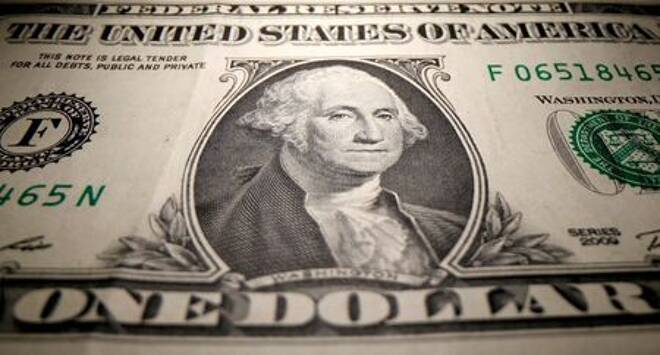Advertisement
Advertisement
Dollar Pares Gains on Dovish Fed Speak, Before ECB Meeting
By:
NEW YORK (Reuters) - The dollar pared gains on Wednesday as Treasury yields dipped after a Federal Reserve official offered a dovish outlook on the economy, and a day ahead of a European Central Bank policy decision.
In this article:
New York Fed Bank President John Williams said that more progress is needed in the labor market to achieve the “substantial further progress” for the Fed’s maximum employment goal.
He added, however, that it may be appropriate for the Federal Reserve to start reducing the pace of its asset purchases later this year if the economy continues to improve.
“The Fed is clearly in wait-and-see mode over the next couple of months to see how the economy holds up. Fed’s Williams delivered some dovish comments that support the idea that the soonest the Fed could taper is December,” Edward Moya, senior market analyst at OANDA in New York, said in a report.
Separately, the Fed said in its latest Beige Book that the U.S. economy “downshifted slightly” in August as the renewed surge of the coronavirus hit dining, travel and tourism.
The dollar index, which measures the currency against six rivals, gained 0.14% to 92.66, after earlier rising to 92.86, the highest since August 27.
Benchmark 10-year Treasury note yields fell to 1.33%, after earlier trading at 1.38%. The yields have risen since data on Friday showed that U.S. jobs growth slowed while wage inflation was higher than expected.
An uptick in inflation is complicating the picture for Fed officials who want to see further progress in employment before reducing bond purchases.
“At its very worst, there is some concern that nominal wages are still lagging consumer price increases by cycle extremes … and that nominal wages are struggling to keep up with prices, which is how a wage-price spiral develops,” Alan Ruskin, a macro strategist at Deutsche Bank, said in a report on Tuesday.
Data on Wednesday showed that U.S. job openings rose to almost 11 million in July.
The euro dipped before the European Central Bank meeting set for Thursday. The ECB could tighten policy sooner than many anticipate as inflationary pressures could prove to be persistent, ECB policymaker Robert Holzmann said in a contribution to Eurofi Magazine on Wednesday.
Analysts polled by Reuters see PEPP purchases falling possibly as low as 60 billion euros a month from the current 80 billion, before a further fall early next year and the scheme’s end in March.
The single currency was last down 0.13% on the day at $1.1823.
The greenback also gained against Canada’s loonie on worries that the global economic outlook is deteriorating even as the Bank of Canada looked past a soft patch in the domestic economy.
Sterling dropped after the British government on Tuesday announced a tax hike to fund health spending and social care.
Meanwhile, cryptocurrencies struggled to rebound from hefty losses from Tuesday, when El Salvador became the first country to adopt bitcoin as legal tender and several trading platforms said they experienced performance issues.
Bitcoin dipped 1.22% to $46,283 after sinking as low as $42,900 on Tuesday. Earlier that day it had touched an almost four-month high of $52,956.
For a look at all of today’s economic events, check out our economic calendar.
(Editing by Sandra Maler)
About the Author
Reuterscontributor
Reuters, the news and media division of Thomson Reuters, is the world’s largest international multimedia news provider reaching more than one billion people every day. Reuters provides trusted business, financial, national, and international news to professionals via Thomson Reuters desktops, the world's media organizations, and directly to consumers at Reuters.com and via Reuters TV. Learn more about Thomson Reuters products:
Latest news and analysis
Advertisement
